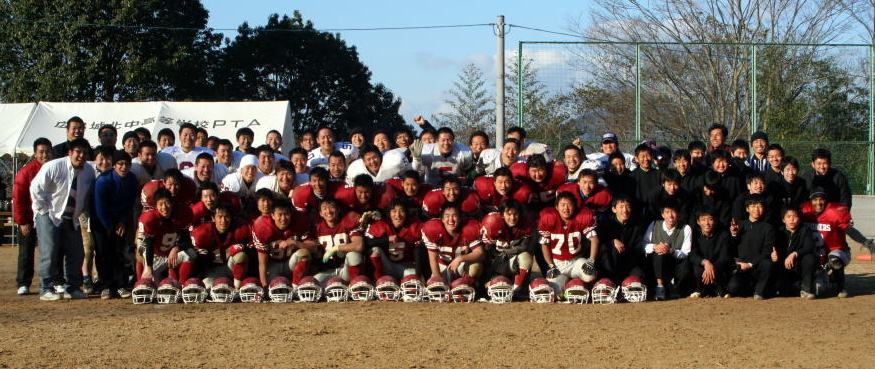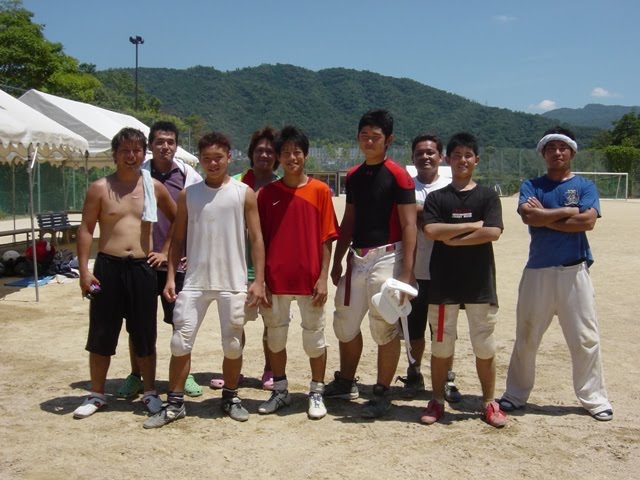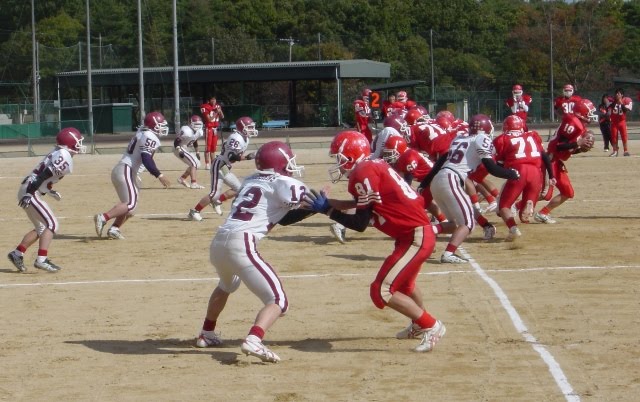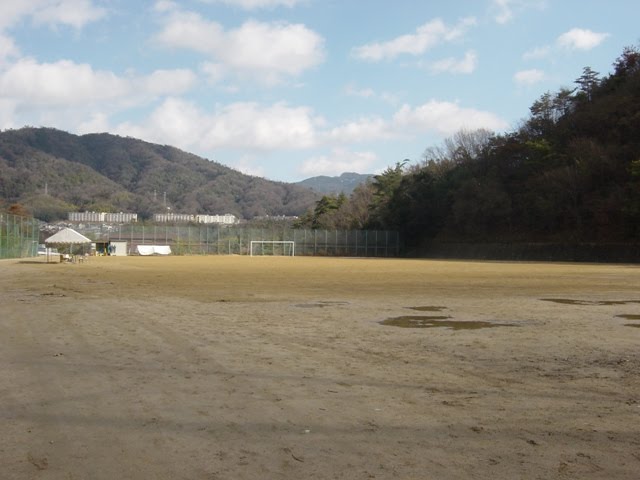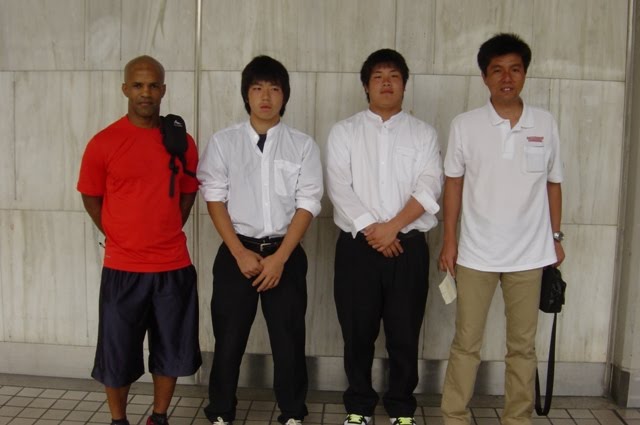
Hiroshima, December 2008 - This was the first scrimmage the 10th graders had ever experienced.
The five 11th graders had only participated in two scrimmages the prior year so they were pretty green. This would be the first of many steps in learning to play as a unit.
..
The teams were balanced by size and experience to minimize chance of injury. I quarterbacked the white team so I could determine who got the ball. If I thought a kid could take care of himself I'd get them the ball.
.
Distributing the football turned out to be simpler than expected as the body language of a kid who wants the ball and one who's just trying to survive are different. As beginners the situation put a lot of pressure on them. The reluctant kids who wanted nothing to do with being the "go to guy" would fidget during the cadence and go the wrong way at the snap.
.
In the offensive huddle there were times we had to talk a kid into being the go to guy on a particular play. They'd often wilt under pressure and plead not to be the targeted receiver or ball carrier. Other players in the huddle would join in the pressuring until the reluctant ones relented. One by one we'd work through the skill positions until everyone got a touch. Afterwards we'd desensitize them by making fun of anything funny that occurred during their big moment.
.
Upon surviving their first collision players often change; they stand, check their limbs, straighten their helmet and skip back to the huddle smiling. Without fail they want the ball again; this transformation occurred with both offensive and defensive players. Although, every now and then a kid will vanish after a scrimmage never to be seen again.
.
Everyday spent among the young is entertaining. On this particular day one or two kids had somehow managed to make it through the entire 45 minutes without touching another person.
Everyday spent among the young is entertaining. On this particular day one or two kids had somehow managed to make it through the entire 45 minutes without touching another person.
.
Purpose...
.
.
When the young guys first joined the team they seemed unaware there was more to the athletic experience than just chasing a ball for a couple hours and going home. Many of the Johoku teams of the past barely had enough players to field a team. There were many complicated reasons for the situation. Consequently many of the beneficial developmental aspects that come from being a member of a team weren't present.
.
As far as I know anytime there's a group or an organization unified in purpose there has to be a synchronization of sorts among it's members. Only then do you have a chance at achieving anything; it's the only reason I show up at the football field. Initially I felt discipline was woefully lacking. Players had different reactions to my methods; some adapted, many resisted. It was a process complicated by local cultural differences. I was encouraged when parents began writing letters expressing appreciation for some of things the kids were doing. That's all I had to go on, instinct and a few letters.
.
.
Scrimmages...
.
.
The scrimmages were a big production. We'd invite any football team or older alumni in the area who still had equipment. In Japan the difference in the level of play in football between high schools and universities is negligible. For Hiroshima area teams at every level it's rare to have enough players for a full scrimmage. Because of this we established an open door policy to anybody willing to don equipment to come to our practice field. Then we'd pull out the red and white game jerseys and have a draft. It was the local debut of the "red versus white" scrimmage phenomenon. The referee was a math teacher.
.
As far as I know anytime there's a group or an organization unified in purpose there has to be a synchronization of sorts among it's members. Only then do you have a chance at achieving anything; it's the only reason I show up at the football field. Initially I felt discipline was woefully lacking. Players had different reactions to my methods; some adapted, many resisted. It was a process complicated by local cultural differences. I was encouraged when parents began writing letters expressing appreciation for some of things the kids were doing. That's all I had to go on, instinct and a few letters.
.
.
Scrimmages...
.
.
The scrimmages were a big production. We'd invite any football team or older alumni in the area who still had equipment. In Japan the difference in the level of play in football between high schools and universities is negligible. For Hiroshima area teams at every level it's rare to have enough players for a full scrimmage. Because of this we established an open door policy to anybody willing to don equipment to come to our practice field. Then we'd pull out the red and white game jerseys and have a draft. It was the local debut of the "red versus white" scrimmage phenomenon. The referee was a math teacher.
.
.
 |
| . The coin toss Green helmets - Shudo University players Striped grey pants - Johoku juniors Plain white pants - Johoku first year players Official - Teacher (2008) Hiroshima, Japan |
...
.
..
.
.
Johoku vs "Old Guys"
(Shudo University & Kure Gulf Angels)
(Shudo University & Kure Gulf Angels)
First Quarter
Hiroshima, Japan (2009)
...
By the fall of 2009 the this particular group had played against much older players on five occasions. Though not ideal, it was good for their confidence as they'd become desensitized to their old fears.
.
.
Johoku alumni helped in many ways...
.
.
.
.
.
.
.
.
.
.
.
.
.
.
.
.
.
.
.
.
.
.
.
.
.
.
.
.











